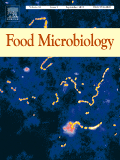
FOOD MICROBIOLOGY
Scope & Guideline
Advancing food safety through microbial insights.
Introduction
Aims and Scopes
- Microbial Safety and Pathogen Control:
Research focusing on the detection, control, and mitigation of foodborne pathogens such as Salmonella, Listeria, and E. coli, including studies on their survival, virulence, and resistance mechanisms. - Food Preservation Techniques:
Investigation of various food preservation methods including the use of bacteriophages, natural antimicrobials, high-pressure processing, and modern technologies like cold plasma and UV light to enhance food safety and shelf life. - Fermentation Science:
Exploration of the roles of different microorganisms in fermentation processes, including yeast and bacteria, and their impact on flavor, aroma, and health benefits in various food products. - Microbiome Studies in Food Systems:
Analysis of microbial communities in food products, including their diversity, dynamics, and interactions, and how these factors influence food quality and safety. - Antimicrobial Resistance and Public Health:
Research on the prevalence and mechanisms of antimicrobial resistance in foodborne pathogens and their implications for food safety and public health. - Biotechnology in Food Production:
Application of biotechnological approaches to improve food quality, safety, and nutritional value through the use of starter cultures, bioactive compounds, and novel fermentation techniques.
Trending and Emerging
- Multi-Omics Approaches:
An increasing number of studies are employing multi-omics techniques (metagenomics, transcriptomics, proteomics) to gain insights into microbial communities and their functional roles in food systems. - Natural Antimicrobials and Biopreservation:
Research into natural antimicrobials derived from plants and microbial sources is gaining popularity as a sustainable approach to enhance food safety and quality. - Food Microbiome and Health Connections:
There is growing interest in the relationship between food microbiomes and human health, including studies on probiotics, gut microbiota interactions, and the health benefits of fermented foods. - Innovative Preservation Technologies:
Emerging preservation technologies such as cold plasma, pulsed light, and advanced biopreservation methods are increasingly being explored for their potential to improve food safety. - Sustainable Food Practices:
Research focusing on sustainability in food production, including the role of microbial communities in food waste reduction and the circular economy, is on the rise. - Consumer Acceptance and Sensory Evaluation:
Studies examining consumer perceptions of food safety, quality, and the sensory attributes of products enhanced by microbiological processes are becoming more prevalent.
Declining or Waning
- Traditional Microbial Testing Methods:
There has been a noticeable reduction in studies relying solely on conventional culture-based methods for microbial detection, as newer molecular techniques such as qPCR and metagenomics gain traction. - Focus on Single Species Pathogen Studies:
Research that previously emphasized the study of single pathogen species is waning. There is now a trend towards understanding complex microbial interactions within food matrices. - General Food Microbiology Reviews:
While comprehensive reviews of food microbiology were once common, there is a declining trend in general reviews, with researchers favoring more specific and targeted studies that address particular issues or innovations.
Similar Journals
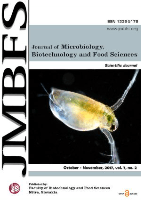
Journal of Microbiology Biotechnology and Food Sciences
Advancing the frontiers of microbiology and food innovation.Journal of Microbiology Biotechnology and Food Sciences, published by SLOVAK UNIV AGRICULTURE NITRA, is a distinguished open-access journal dedicated to advancing scholarship in the interrelated fields of microbiology, biotechnology, and food sciences. With an ISSN of 1338-5178, this journal has been accessible to researchers worldwide since 2011, providing a platform for innovative studies that contribute to the understanding of microbial processes, biotechnological advancements, and food science applications. As reflected in its 2023 category quartiles, the journal holds notable positions in Biotechnology (Q3) and Food Science (Q3), and while it ranks in the lower quartiles for Microbiology (Q4) and Molecular Biology (Q4), it is committed to enhancing its impact within these domains. The journal encourages the submission of high-quality research articles, reviews, and short communications that address critical issues in these fields, making it an essential resource for academics, industry professionals, and students alike. Emphasizing both foundational research and practical applications, the Journal of Microbiology Biotechnology and Food Sciences stands as a vital contributor to the scientific discourse, fostering innovation and collaboration among researchers aiming to solve pressing challenges in food safety, biotechnology development, and microbial studies.

INDIAN JOURNAL OF MICROBIOLOGY
Pioneering Research at the Microbial FrontierINDIAN JOURNAL OF MICROBIOLOGY, published by Springer, serves as a vital platform for the dissemination of cutting-edge research in the field of microbiology. With an ISSN of 0046-8991 and an E-ISSN of 0973-7715, this esteemed journal invites contributions that span various disciplines within microbiology, encompassing both fundamental studies and applied research that can impact health, environment, and industry. Recognized in the Q3 category in Microbiology for 2023, and ranking #80 out of 182 in Scopus’ Microbiology category, it reflects its commitment to quality and significance in the academic community. Authors and researchers benefit from the journal's comprehensive review process, which enhances the visibility and reach of their work. While no open access options are currently offered, the INDIAN JOURNAL OF MICROBIOLOGY remains a premier choice for those aiming to contribute to the ongoing dialogue in microbiological studies, ensuring that knowledge continues to evolve and thrive.
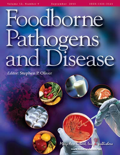
Foodborne Pathogens and Disease
Innovating solutions for a healthier tomorrow.Foodborne Pathogens and Disease is a leading peer-reviewed journal, published by MARY ANN LIEBERT, INC, that focuses on the critical field of food safety and microbiology. With a robust ISSN of 1535-3141 and an E-ISSN of 1556-7125, this journal has established itself as a pivotal resource since its inception in 2004. It serves as an essential platform for researchers, professionals, and students dedicated to understanding the risks associated with foodborne pathogens and their impact on public health. The journal holds impressive rankings, being categorized in Q1 for Animal Science and Zoology and Q2 for Applied Microbiology and Biotechnology and Food Science according to the latest quartiles. Additionally, it ranks high within Scopus, occupying the 90th percentile in Agricultural and Biological Sciences (Animal Science and Zoology). Though not an open-access publication, it provides valuable insights and data that contribute to the evolving discourse on food safety, the prevention of foodborne diseases, and the advancement of biotechnology in food science. As it converges towards its 20th anniversary in 2024, Foodborne Pathogens and Disease continues to be an indispensable source of information for those committed to the betterment of food safety and public health.
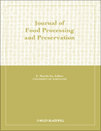
JOURNAL OF FOOD PROCESSING AND PRESERVATION
Delivering Insights for a Safer, Sustainable Food FutureJOURNAL OF FOOD PROCESSING AND PRESERVATION, published by Wiley-Hindawi, stands as a vital resource within the fields of Food Science, Chemical Engineering, and Chemistry. With an ISSN of 0145-8892 and an E-ISSN of 1745-4549, the journal has been a beacon of knowledge since its inception in 1977, continuing to provide valuable insights to the research community until 2024. Recognized for its quality, it holds a noteworthy Q2 ranking in 2023 across multiple categories, including Food Science and Chemical Engineering, indicating its influential contribution to the academic discourse. Although it offers no open access, the journal remains a crucial platform for disseminating groundbreaking research and innovative methodologies in food processing and preservation. Researchers, professionals, and students can significantly benefit from its comprehensive reviews, original research articles, and case studies, aimed at advancing knowledge and practices in food technology. By bridging the gap between theoretical advancements and practical applications, the JOURNAL OF FOOD PROCESSING AND PRESERVATION plays an essential role in addressing global food safety, sustainability, and quality challenges.
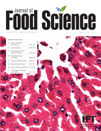
JOURNAL OF FOOD SCIENCE
Exploring the Science Behind Every BiteJOURNAL OF FOOD SCIENCE, published by Wiley, is a premier journal dedicated to advancing the field of food science, bridging the gap between fundamental research and practical application. With an impressive impact factor reflecting its authoritative status, the journal is ranked in the Q1 quartile for Food Science in 2023 and boasts a Scopus ranking of #71 out of 389, placing it in the 81st percentile within Agricultural and Biological Sciences. First launched in 1936, the journal continues to serve as an essential platform for researchers, professionals, and students to disseminate innovative studies and reviews that address critical issues in food quality, safety, and technology. While not currently offering open access, its rigorous peer-review process ensures the dissemination of high-quality and impactful research. Researchers engaged in the vital disciplines of food science will find this journal indispensable for keeping abreast of cutting-edge developments in the field.

ARCHIVES OF MICROBIOLOGY
Fostering Innovation in Microbial ResearchThe Archives of Microbiology, published by Springer, is a reputable journal in the field of microbiology, serving as a vital platform for the dissemination of groundbreaking research and critical reviews since its inception in 1974. With an ISSN of 0302-8933 and an E-ISSN of 1432-072X, this journal operates out of Germany and maintains a global reach, promoting high-quality scholarship across multiple disciplines, including biochemistry, genetics, and molecular biology, as evidenced by its Q2 ranking in Medicine (miscellaneous) and consistent Q3 placements in other categories in 2023. Although the journal does not offer open access options, its rigorous peer-review process ensures that published articles are of the highest standard, making it an essential resource for researchers, professionals, and students keen on advancing their understanding of microbial sciences. As the journal converges toward 2024, it remains committed to fostering innovative microbiological research and facilitating interdisciplinary dialogue within the scientific community.
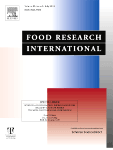
FOOD RESEARCH INTERNATIONAL
Exploring Innovations in Food Safety and QualityFOOD RESEARCH INTERNATIONAL is a premier academic journal published by ELSEVIER, specializing in the field of Food Science. With an impressive impact factor and ranked Q1 in the 2023 category quartiles, it stands at the forefront of research, positioned 17th out of 389 in the Scopus ranking for Agricultural and Biological Sciences, attaining a commendable 95th percentile. The journal publishes high-quality, peer-reviewed articles that cover a broad spectrum of topics, including food safety, quality control, nutrition, and biotechnology, making it an invaluable resource for academics, industry professionals, and students alike. As FOOD RESEARCH INTERNATIONAL seeks to enhance understanding and advance technologies related to food, it encourages innovative perspectives and interdisciplinary research. The journal, active from 1992 and continuing through 2024, is an essential platform for disseminating vital findings and fostering collaboration within the global food science community.
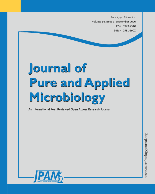
Journal of Pure and Applied Microbiology
Empowering Science with Open Access Microbial InsightsJournal of Pure and Applied Microbiology, published by DR M N KHAN, is an esteemed Open Access journal that has been dedicated to advancing the frontiers of microbiological research since its inception in 2007. Located in Bhopal, Madhya Pradesh, India, this journal presents a platform for researchers and professionals in the fields of Applied Microbiology and Biotechnology, offering insights that span a diverse range of topics critical to both scientific progress and industrial applications. As of 2023, the journal is categorized in the Q3 and Q4 quartiles, demonstrating its relevance and growing impact within the community—ranking #219 in Biochemistry, Genetics and Molecular Biology and #93 in Immunology and Microbiology. With an emphasis on accessibility, the journal has embraced an Open Access format since 2017, allowing for a wider dissemination of knowledge. By publishing high-quality research, the Journal of Pure and Applied Microbiology plays a pivotal role in fostering innovation and collaboration among researchers, students, and industry professionals alike.
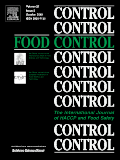
FOOD CONTROL
Exploring the nexus of safety, quality, and sustainability.FOOD CONTROL, published by Elsevier Science Ltd, stands at the forefront of research in the fields of Food Science and Biotechnology, holding a prestigious Q1 ranking in both categories as of 2023. With an impact factor reflecting its influential role in the scientific community, this journal is dedicated to advancing the understanding and control of food safety, quality, and regulations from 1990 to its projected convergence in 2025. Food Control provides a platform for innovative research and critical reviews that address the pressing global challenges in food safety, sustainability, and technological advancements in the industry. Researchers, professionals, and students are encouraged to engage with its content, fostering a deeper understanding of the intersection between food science and biotechnological advancements, all while benefiting from the extensive reach of its Scopus rankings, which place it in the top 5th percentile of its respective fields.

FOOD SCIENCE AND BIOTECHNOLOGY
Unleashing the Power of Biotechnology in Food ScienceFOOD SCIENCE AND BIOTECHNOLOGY, published by the Korean Society of Food Science & Technology (KOSFOST), stands as a prominent peer-reviewed journal dedicated to advancing knowledge in the fields of food science, biotechnology, and applied microbiology. With ISSN 1226-7708 and E-ISSN 2092-6456, this journal serves as a pivotal platform for disseminating high-impact research from South Korea and beyond, reflecting a robust Q2 ranking in multiple categories including Applied Microbiology and Biotechnology, Biotechnology, and Food Science as of 2023. The journal's influence is further emphasized by its positions in various Scopus ranks, where it showcases a commendable percentile ranking in Agricultural and Biological Sciences and Biochemistry. Although access options remain limited, the journal’s objectives revolve around the publication of innovative research, fostering interdisciplinary collaboration, and facilitating the exchange of ideas among a diverse community of researchers, professionals, and students. Whether you are involved in food technology, microbial biotechnology, or nutritional sciences, FOOD SCIENCE AND BIOTECHNOLOGY are instrumental in shaping the future of these critical fields, propelling advancements that enrich our understanding of food systems and health.